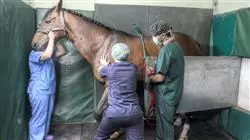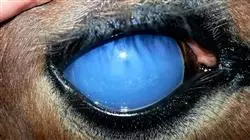University certificate
The world's largest faculty of veterinary medicine”
Introduction to the Program
A complete and comprehensive update in Neurology, Ophthalmology and Extended Therapeutic Protocols in Equine Ambulatory Practice with the most complete and effective preparatory program in the online training market"

This course will review the most important aspects of neurological and ophthalmological pathologies.
The acute onset of many of the neurological conditions requires decisions to be made in a short time. Therefore, it is necessary to master the neurological examination to extract as much information as possible from our patient and work on the basis of the clinical pictures and their differential diagnoses to effectively deal with these processes in the field.
Sedation and anesthesia in the field is a common clinical practice that requires a certain degree of specialization in order to be able to adapt it to the patient being treated at any given moment. The chapter will provide the clinician with the necessary technical skills to be able to induce, maintain and reverse anesthesia in the field from beginning to end, ensuring the lowest possible risks for the patient and guaranteeing the smooth running of the surgical procedure.
On the other hand, topics specific to hospital intensive care units will be addressed, such as pain management, correction of hydro-electrolyte and acid-base balance, intensive care in neonates and adults, with the aim of providing the student with the necessary skills to enable him/her to treat a patient with ICU requirements while outside a hospital setting.
Join the elite, with this highly efficient specialization and open new paths to your professional progress"
This Postgraduate certificate in Neurology, Ophthalmology and Expanded Therapeutic Protocols in Equine Ambulatory Practice offers you the characteristics of a high-level scientific teaching and technological course. These are some of its most notable features:
- The latest technology in online teaching software
- A highly visual teaching system, supported by graphic and schematic contents that are easy to assimilate and understand
- Practical cases presented by practising experts
- State-of-the-art interactive video systems
- Teaching supported by telepractice
- Continuous updating and recycling systems
- Autonomous learning: full compatibility with other occupations
- Practical exercises for self-evaluation and learning verification
- Support groups and educational synergies: questions to the expert, debate and knowledge forums
- Communication with the teacher and individual reflection work
- Content that is accessible from any fixed or portable device with an Internet connection
- Supplementary documentation databases are permanently available, even after the course
A complete program that will allow you to acquire the most advanced knowledge in all the areas of intervention of the Equine Veterinarian"
Our teaching staff is made up of professionals from different fields related to this specialty. In this way, we ensure that we provide you with the training update we are aiming for. A multidisciplinary team of professionals trained and experienced in different environments, who will develop the theoretical knowledge in an efficient way, but, above all, will put at your disposal their practical knowledge from their own experience: one of the differential qualities of this specialization.
The efficiency of the methodological design of this Professional Master's Degree, enhances the student's understanding of the subject. Developed by a multidisciplinary team of e-learning experts, it integrates the latest advances in educational technology. This way, you will be able to study with a range of comfortable and versatile multimedia tools that will give you the operability you need in your training.
The design of this program is based on Problem-Based Learning: an approach that conceives learning as a highly practical process. To achieve this remotely, we will use telepractice: with the help of an innovative interactive video system, and learning from an expert, you will be able to acquire the knowledge as if you were actually dealing with the scenario you are learning about. A concept that will allow you to integrate and fix learning in a more realistic and permanent way.
With a methodological design based on proven teaching techniques, this innovative course will take you through different teaching approaches to allow you to learn in a dynamic and effective way"

Our innovative telepractice concept will give you the opportunity to learn through an immersive experience, which will provide you with a faster integration and a much more realistic view of the contents: “learning from an expert"
Why study at TECH?
TECH is the world’s largest online university. With an impressive catalog of more than 14,000 university programs available in 11 languages, it is positioned as a leader in employability, with a 99% job placement rate. In addition, it relies on an enormous faculty of more than 6,000 professors of the highest international renown.

Study at the world's largest online university and guarantee your professional success. The future starts at TECH”
The world’s best online university according to FORBES
The prestigious Forbes magazine, specialized in business and finance, has highlighted TECH as “the world's best online university” This is what they have recently stated in an article in their digital edition in which they echo the success story of this institution, “thanks to the academic offer it provides, the selection of its teaching staff, and an innovative learning method aimed at educating the professionals of the future”
A revolutionary study method, a cutting-edge faculty and a practical focus: the key to TECH's success.
The most complete study plans on the university scene
TECH offers the most complete study plans on the university scene, with syllabuses that cover fundamental concepts and, at the same time, the main scientific advances in their specific scientific areas. In addition, these programs are continuously being updated to guarantee students the academic vanguard and the most in-demand professional skills. In this way, the university's qualifications provide its graduates with a significant advantage to propel their careers to success.
TECH offers the most comprehensive and intensive study plans on the current university scene.
A world-class teaching staff
TECH's teaching staff is made up of more than 6,000 professors with the highest international recognition. Professors, researchers and top executives of multinational companies, including Isaiah Covington, performance coach of the Boston Celtics; Magda Romanska, principal investigator at Harvard MetaLAB; Ignacio Wistumba, chairman of the department of translational molecular pathology at MD Anderson Cancer Center; and D.W. Pine, creative director of TIME magazine, among others.
Internationally renowned experts, specialized in different branches of Health, Technology, Communication and Business, form part of the TECH faculty.
A unique learning method
TECH is the first university to use Relearning in all its programs. It is the best online learning methodology, accredited with international teaching quality certifications, provided by prestigious educational agencies. In addition, this disruptive educational model is complemented with the “Case Method”, thereby setting up a unique online teaching strategy. Innovative teaching resources are also implemented, including detailed videos, infographics and interactive summaries.
TECH combines Relearning and the Case Method in all its university programs to guarantee excellent theoretical and practical learning, studying whenever and wherever you want.
The world's largest online university
TECH is the world’s largest online university. We are the largest educational institution, with the best and widest online educational catalog, one hundred percent online and covering the vast majority of areas of knowledge. We offer a large selection of our own degrees and accredited online undergraduate and postgraduate degrees. In total, more than 14,000 university degrees, in eleven different languages, make us the largest educational largest in the world.
TECH has the world's most extensive catalog of academic and official programs, available in more than 11 languages.
Google Premier Partner
The American technology giant has awarded TECH the Google Google Premier Partner badge. This award, which is only available to 3% of the world's companies, highlights the efficient, flexible and tailored experience that this university provides to students. The recognition as a Google Premier Partner not only accredits the maximum rigor, performance and investment in TECH's digital infrastructures, but also places this university as one of the world's leading technology companies.
Google has positioned TECH in the top 3% of the world's most important technology companies by awarding it its Google Premier Partner badge.
The official online university of the NBA
TECH is the official online university of the NBA. Thanks to our agreement with the biggest league in basketball, we offer our students exclusive university programs, as well as a wide variety of educational resources focused on the business of the league and other areas of the sports industry. Each program is made up of a uniquely designed syllabus and features exceptional guest hosts: professionals with a distinguished sports background who will offer their expertise on the most relevant topics.
TECH has been selected by the NBA, the world's top basketball league, as its official online university.
The top-rated university by its students
Students have positioned TECH as the world's top-rated university on the main review websites, with a highest rating of 4.9 out of 5, obtained from more than 1,000 reviews. These results consolidate TECH as the benchmark university institution at an international level, reflecting the excellence and positive impact of its educational model.” reflecting the excellence and positive impact of its educational model.”
TECH is the world’s top-rated university by its students.
Leaders in employability
TECH has managed to become the leading university in employability. 99% of its students obtain jobs in the academic field they have studied, within one year of completing any of the university's programs. A similar number achieve immediate career enhancement. All this thanks to a study methodology that bases its effectiveness on the acquisition of practical skills, which are absolutely necessary for professional development.
99% of TECH graduates find a job within a year of completing their studies.
Postgraduate Certificate in Neurology, Ophthalmology and Expanded Therapeutic Protocols in Equine Ambulatory Practice
The sudden onset of many neurologic disorders requires rapid decision making. Therefore, it is essential that the practitioner be able to perform a thorough neurological examination of the animal to obtain all relevant patient information and work on the basis of clinical pictures and differential diagnoses to deal with these processes effectively. In fact, you will be able to do so with all the guarantees by developing this Postgraduate Certificate in Neurology, Ophthalmology and Expanded Therapeutic Protocols in Equine Ambulatory Practice, which focuses on the most effective strategies with equines.
Get updated in the approach to equine neurological pathologies
With the Postgraduate Certificate in Neurology, Ophthalmology and Expanded Therapeutic Protocols in Equine Ambulatory Practice, you will establish differential diagnoses based on the main neurological pathologies of the horse and analyze the diagnostic tools available for the different processes. At the same time, you will deepen in the use of diagnostic tools in Ophthalmology, such as the direct and indirect ophthalmoscope. Always from a convenient online methodology, you will have the opportunity to update yourself from anywhere through an academic path condensed in 300 hours.







